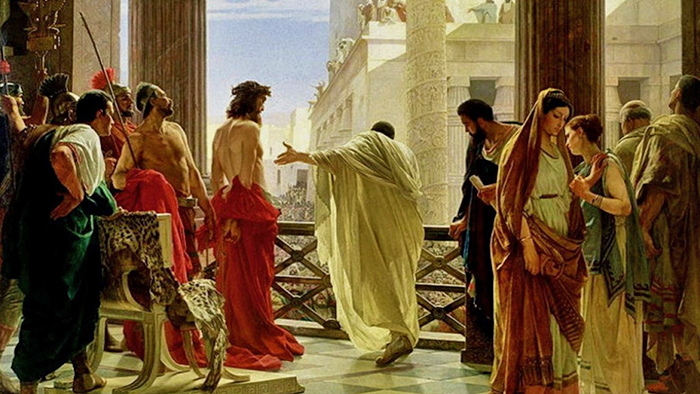
And there is a huge irony in how it is described. Jesus is on trial, but the story is written in such a way that, in effect, everyone is on trial, except Jesus. The Jewish authorities who orchestrated his arrest are on trial for their jealousy and dishonesty. The Roman authorities who wield the final power on the matter are on trial for their religious blindness. Jesus’ friends and contemporaries are on trial for their weakness and betrayal. Those who challenge Jesus to invoke divine power and come off the cross are on trial for their superficial faith. And, not least, each of us is on trial for our own weaknesses, jealousies, religious blindness, and superficial faith. The transcript of the trial of Jesus reads like a record of our own betrayals. Recently the church has tried to help us grasp this by the manner in which it has the Passion proclaimed on Palm Sunday and Good Friday. In many churches today when the Passion is read the narrative is broken up in such a way that one narrator proclaims the overall text, another person takes the part of Jesus, several others take the parts of the various people who spoke during his arrest and trial, and the congregation as a whole is asked to proclaim aloud the parts that were spoken by the crowds. This could not be more appropriate because a congregation in any Christian church today, and we, as individual members of those congregations, in our actions and in our words, in countless ways, mimic perfectly the actions and words of Jesus’ contemporaries in their weaknesses, betrayals, jealousies, religious blindness, and false faith. We too indict Jesus countless times by how we live. It is the same when the crowds say to Pilate: “We have no king, except Caesar!” In saying this, they were abandoning their own messianic hopes in favor of a momentary security. We say the same thing every time when, for our own well-being, we sell-out our higher ideals and settle for second best. As well, all too frequently, we mimic the words of the crowds who challenged Jesus as he was hanging on the cross with these words: “If you are the Son of God, come off the cross, save us, and save yourself.” We do this every time we let our prayers become a test of God’s existence and goodness; if we get a positive answer, God loves us, if not, we begin to doubt. Generally, on reading the account of Jesus’ Passion and Death, our spontaneous inclination is to judge very harshly those who surrounded Jesus at his arrest, trial, and sentencing: How could they not see what they were doing? How could they be so blind and jealous? How could they choose false security over God’s ultimate shelter? A murderer over the Messiah? How could his followers so easily abandon him? Not much has changed in 2000 years. The choices that those around Jesus were making during his trial and sentencing are identical to the choices we are still making today. And most days we are not doing any better than they did because, still, far too often, given blindness and self-interest, we are saying: Away with him! Crucify him![1]
[1] Excerpt from Fr. Ron Rolheiser’s reflection, “The Transcript of Our Trial” April 2014.
